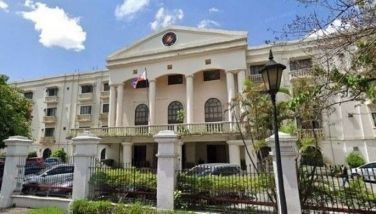‘Burping can lead to cancer’
January 11, 2006 | 12:00am
Unknown to many Filipinos, a condition mistaken for a case of intermittent "dighay" or burping could lead to cancer of the esophagus, an expert said yesterday.
Dr. Venancio Gloria, a gastroenterologist and president of the Philippine College of Physicians, said many Filipinos are born with a weak sphincter — the band of muscles connecting the stomach to the esophagus — and certain habits predispose them to gastro-esophageal reflux disease, better known as GERD or reflux disease.
"The sphincter prevents the backflow of anything (from our stomach). If the sphincter is weak (and the stomach fluids are highly acidic), acid or bile regurgitates up to the mouth," he told journalists who attended a weekly health forum.
He said reflux disease is different from dighay and sinok (hiccupping). There is no Filipino term for this condition.
While there are no statistics on reflux disease in the Philippines, Gloria has observed that more Filipinos are seeking treatment in his clinics at the Philippine General Hospital, Medical City and Manila Doctors Hospital. He usually sees 25 patients per month for the condition.
Gloria warned that cigarette smoking, ingesting alcohol, fatty foods and spices, obesity, and wearing tight pants could make a person prone to reflux disease because they all affect the sphincter.
In severe cases of reflux disease, mucous tends to develop in the esophagus to cover areas constantly hit by acid, which is "potentially cancerous."
Gloria, however, clarified that Filipinos and other Asians are genetically unlikely to develop esophageal cancer from reflux disease, unlike Caucasians.
He said reflux disease is usually associated with heartburn and regurgitation, but these symptoms can overlap with those of other conditions, particularly heart ailments. — Sheila Crisostomo
Dr. Venancio Gloria, a gastroenterologist and president of the Philippine College of Physicians, said many Filipinos are born with a weak sphincter — the band of muscles connecting the stomach to the esophagus — and certain habits predispose them to gastro-esophageal reflux disease, better known as GERD or reflux disease.
"The sphincter prevents the backflow of anything (from our stomach). If the sphincter is weak (and the stomach fluids are highly acidic), acid or bile regurgitates up to the mouth," he told journalists who attended a weekly health forum.
He said reflux disease is different from dighay and sinok (hiccupping). There is no Filipino term for this condition.
While there are no statistics on reflux disease in the Philippines, Gloria has observed that more Filipinos are seeking treatment in his clinics at the Philippine General Hospital, Medical City and Manila Doctors Hospital. He usually sees 25 patients per month for the condition.
Gloria warned that cigarette smoking, ingesting alcohol, fatty foods and spices, obesity, and wearing tight pants could make a person prone to reflux disease because they all affect the sphincter.
In severe cases of reflux disease, mucous tends to develop in the esophagus to cover areas constantly hit by acid, which is "potentially cancerous."
Gloria, however, clarified that Filipinos and other Asians are genetically unlikely to develop esophageal cancer from reflux disease, unlike Caucasians.
He said reflux disease is usually associated with heartburn and regurgitation, but these symptoms can overlap with those of other conditions, particularly heart ailments. — Sheila Crisostomo
BrandSpace Articles
<
>
- Latest
- Trending
Trending
Latest






























